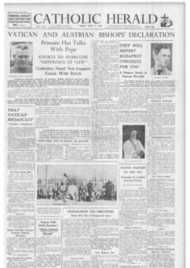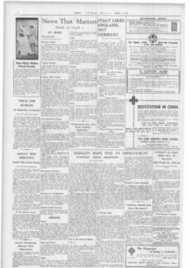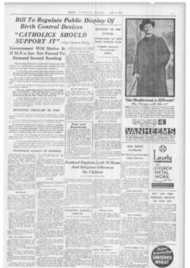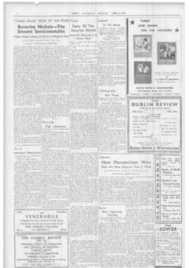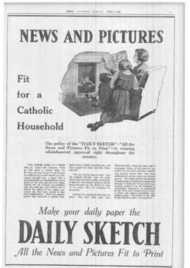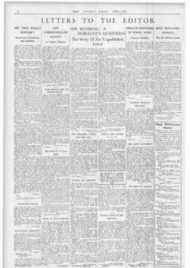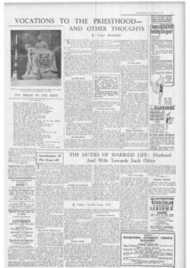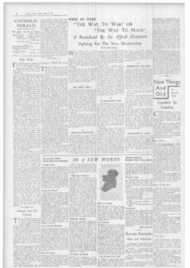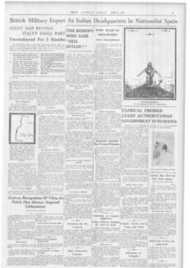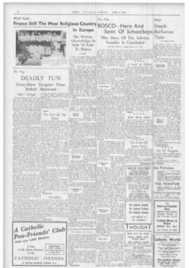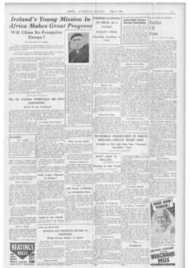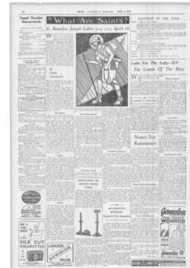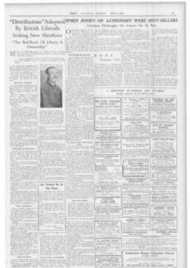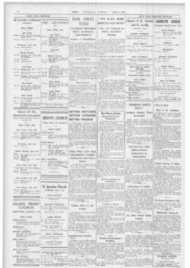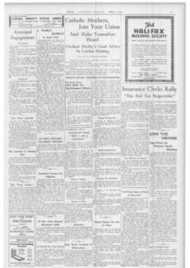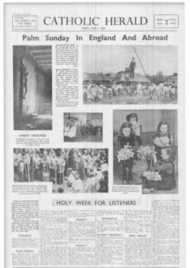Page 1, 8th April 1938
Page 1
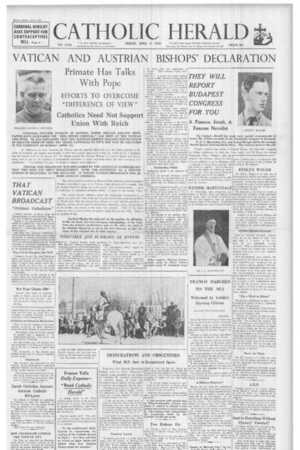
Report an error
Noticed an error on this page?If you've noticed an error in this article please click here to report it.
Tags
Share
Related articles
Ustri N Cardinal's 'difference Of View' With Vatican Not...
The Bishops Who Said "heil Hitler ! "
Hitler And Catholic Opinion In. Rome
Austria And The Vatican
Austrian Facts Being Distorted Catholics Deceived Bogus "...
VATICAN AND AUSTRIAN BISHOPS' DECLARATION
Primate Has Talks
With Pope
EFFORTS TO OVERCOME "DIFFERENCE OF VIEW" Catholics Need Not Support Union With Reich
, CARDINAL INNITZER, PRIMATE OF AUSTRIA, WHOM CERTAIN ENGLISH NEWSPAPERS HAVE NICKNAMED THE "HEIL HITLER CARDINAL," HAS BEEN AT THE VATICAN THIS WEEK. HE HAS EXPLAINED THAT THE AUSTRIAN BISHOPS' DECLARATION IN FAVOUR OF GREATER GERMANY DOES NOT OBLIGE CATHOLICS TO VOTE ONE WAY OR THE OTHER IN THE PLEBISCITE ON SUNDAY (APRIL 10).
• A " difference of view " between the Vatican and the Austrian Hierarchy over the latter's attitude to the union of Germany and Austria was thought to have been greatly aggravated during the week-end by a broadcast over the Vatican radio by Fr. Immer, S.J. Fr. Immer accused the Austrian Bishops of a lack of dignity and loyalty, saying that it was not the business of ecclesiastical authorities to make statements about the social successes of a government. " No Catholic," he said, " is bound to support such judgment."
THOUGH THIS BROADCAST WAS DISCLAIMED BY THE VATICAN IT IS POINTED OUT THAT THIS DOES NOT IMPLY DISAGREEMENT WITH THE STATEMENT AS A PRIVATE OPINION OF RELEVANCE TO THE SITUATION. IN FUTURE VATICAN BROADCASTS WILL BE MORE STRICTLY CENSORED.
The visit of Cardinal Innitzer to Rome and his statement to the Osservatore Romano, semi-official organ of the Vatican, make nonsense of the reports " that the Roman Church is facing one of its gravest crises in modern times . . . from a weakening of centralised authority within," as stated by the Sunday Times.
The correct detailed solution, writes our Diplomatic Correspondent, as regards any particular event of the age-long and intrinsically perplexing problem of Church and State has always been difficult to reach and the possibility of differing attitudes on the part of ecclesiastical authorities, acting independently of one another, has always ,to be taken into account. Only if the lesser authority were to refuse to obey the greater could there be any crisis. There is no question of this.
Cardinal Hinsley has summed up the position by affirming, on the one hand, the never-changing independence of the Pope from any political consideration and, on the other, the right of the Austrian Hierarchy to act in the best interests, as they see them, of the religious life of their country.
TIMETABLE AND SUMMARY OF EVENTS
MARCH 18: Cardinal Innitzer writes to Herr BilerckeI, Plebescite Commissioner, enclosing proposed solemn proclamation as to Catholic attitude as agreed upon and signed by all Bishops in conference. MARCH 21: As a result of relations with Biterckel introductory note," affirming desire for German unity and expressing confidence in Bilerckel's assurances about God and Caesar, was written, signed by two Archbishops only and approved by Bilerckel. Marti 27: Three statements read from pulpits—
(I) " Introductory Note," signed by two Archbishops: (2) " Solemn Declaration," signed by Hierarchy but probably issued in a briefer form than first draft; (3) " Explanatory Note," reserving rights of God and Church. This was added independently of Bticrckel and possibly at instance of Papal Nuncio.
MARCH 28: First two statements published
by whole Press and reproduced as posters. Third statement entirely boycotted.
Meant 31: A second letter from Cardinal lnnitzer to Herr Bilerckel denying that the declaration was due to any pressure from Ribbentrop or any bargain, but was the spontaneous result of " our profession of faith springing solely from our common German blood," and hoping that it would be a turning point in the relations between Church and State.
APRIL 1: Official statement in the Osservatore Romano that the declaration was solely the responsibility of the Austrian Hierarchy and formulated without any reference to the Holy See.
Unofficial broadcast over Vatican wireless on " Political Catholicism," condemning the action of the Austrian Hierarchy. Address delivered by Fr. Immer, S.J., presumably with approval of the Society of Jesus.
APRIL 3: Official statement in the Osservalore Romano that the broadcast was about a highly controversial subject, was unofficial and in no way involves the responsibility of the Holy See.
APRIL 5: Cardinal Innitzer goes to Rome to see the Pope.
APRIL 6: Cardinal Innitzer makes statement to the Osservatore Romano that the Austrian Bishops' advice to vote for the Austin-German union must not be interpreted as imposing a duty of conscience, and must not be used as propaganda. The Austrian bishops demanded that educational laws should correspond to the natural rights of parents, and the religious and moral formation of Catholic youth.. Propaganda against religion and the Church must stop.
Outstanding Points
Outstanding points in the sequence of events are :— (1) That the Austrian Hierarchy acted of its own free will, but apparently not in entire unanimity throughout, and kept in close touch with the Plebiscite Commissioner.
(2) That the German Hierarchy, save for one isolated instance in which the auxiliary Bishop of Fulda called for a " Yes" answer to the plebiscite, have remained silent in the awkward predicament either of doing the same as their Austrian brethren in apparent contradiction to their long fight to keep German Catholics untouched by the anti-religion excesses and false philosophies of Nazism, or of appearing to be less good citizens than their fellow Austrian Bishops.
(3) The attitude of the Austrian Hierarchy has proved of immense importance to the plebiscite campaign, and has strengthened immeasurably those who, whether within or without Germany, hold that full Nazism is compatible with full Catholicism, in apparent contradiction to tIw teechiag cafethe Papal Encyclical.
(4) The Vatican, while dissociating itself from the Jesuit broadcast on " Political Catholicism " with its strictures on the Austrian Hierarchy, has maintained its complete independence of the Austrian action and left it to be inferred that it is in disagreement with it, though recognising that the Austrian Hierarchy was justified in acting independently and in what it conceived to be the best religious interests of its flock.
Other reports: German Correspondent—page 9; Rome Correspondent—page 9; Comment—page 8.
blog comments powered by Disqus


